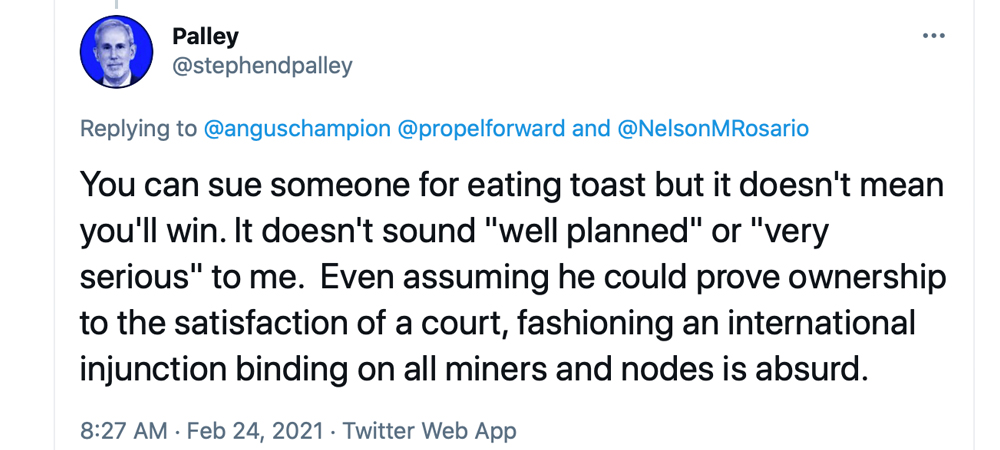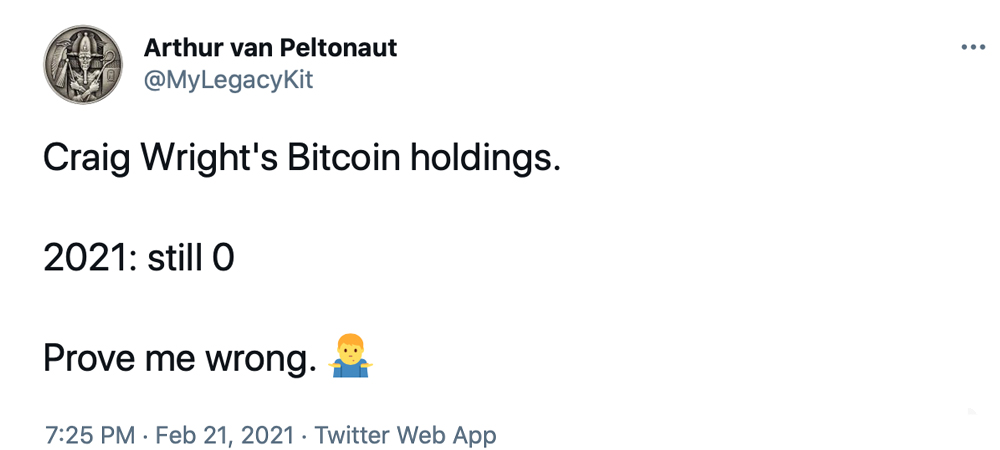Craig Wright, who claims to be Satoshi Nakamoto, appears to be planning to take legal action against a number of open source blockchain developers. Wright’s legal team, Ontier LLP, has reportedly sent letters to programmers who are also working on blockchains like Bitcoin, Bitcoin Cash, and Bitcoinsv. The legal steps of the self-proclaimed Bitcoin inventor state that 111,000 Bitcoin were stolen from his “computer network” in February 2020.
The so-called fiduciary duty: regaining access to the allegedly stolen keys
The Australian businessman, who has claimed to be Satoshi Nakamoto for years, has announced that he will take legal action against open source developers. Despite the fact that many experts, the media, and the wider crypto community believe Wright’s Satoshi Nakamoto claims are false, Wright continues to stand behind his word.
Bitcoin developers must expect a lawsuit from Bitcoin inventor #DrCraigWrighthttps: //t.co/5J2141jRxT in the amount of 3.5 billion GBP
ONTIER team led by Paul Ferguson, Derek Stinson and Oliver Cain.
– ONTIER LLP (@ONTIERLLP) February 24, 2021
Recently, Wright’s legal team asked some sites like bitcoin.org to remove the whitepaper from the domain over alleged copyright claims. Now reports are revealing that Wright has begun his next form of legal action. Coingeek contributor Jordan Atkins explains that Wright stole the private keys of two Bitcoin addresses in a hack.
Atkins and the letter from Ontier LLP state that as early as June 2020, Wright sent letters to developers working on BTC and other public blockchains. Wright and his legal team appear to believe that incumbent Bitcoin network developers are legally responsible for “preventing illegitimate transactions from entering the blockchain”.
Ontier’s letter shows two addresses and one address contains 79,957.20 BTC while the other address contains 31,000 BTC. At both addresses, all coins are still idle, and the corresponding BCH and BSV tokens are also retained. The address with the 79k BTC has never issued a satoshi since it was founded ten years ago. The 31,000 BTC address had issued 21,700 coins during the wallet’s 11-year life.
Ontier’s letters are said to have been sent in June, and the latest notice states: “We have received no replies on the important matters set out in our June 12 letter.” The legal team said they noticed that extracts of the letter were posted online. Ontier’s letter was also written on behalf of a company called Tulip Trading Ltd (TTL) and claims that Wright owned the keys to TTL.
“Unknown hackers stole the private keys for the addresses and deleted copies of the keys on Dr. Craig Wright’s computer,” the Ontier said. “It prevented him from accessing the digital assets at the addresses that he operated on behalf of TTL. Accordingly, TTL (without the developers taking steps) is unable to access or control digital assets that are the legal property of TTL, ”the letter adds.
The developers are also informed that the written correspondence is merely a “pre-promotion letter”. If there is no answer, “legal action can be taken”.
“We urgently recommend that you seek legal counsel,” the letter emphasizes.
The ‘1FeeX’ Mt Gox Mystery and a ‘Steamy Bunch of Horse Puckey’
As early as June, when the original letters were sent, the publication Coingeek wrote about the alleged hack and the author claimed it was “more complex [than the] Lawsuit against Kleiman against Wright in Florida. “Essentially, the final round of letters is asking developers to give Wright access to the allegedly stolen keys. The notices also indicate that the developers have “legal obligations under English law” because they have “a high degree of power and control”.
The Ontier notice also indicates that the TTL and Wright argument will be based on illicit and fiduciary duties. Wright also claims ownership of the corresponding Bitcoin Cash (BCH) and Bitcoinsv (BSV) tied to these two addresses.

The interesting thing about one of the addresses mentioned in the letter is that it is said to have connections to the Mt Gox hack. Following news that Ontier’s letters had been sent to developers in February, Monero’s Riccardo Spagni tweeted about the conflict of interest with the specific address associated with the now-defunct exchange. Spagni also referred to the conflict of interest with the address “1FeeX” on June 12, 2020.
On February 24, 2021, Spagni said:
Finally, through his attorneys, we have confirmation that Craig Wright is the Mt Gox hacker (see his ownership claim at the 1FeeX address). I would imagine that those affected by the Mt Gox hack would want to go after Craig Wright for stealing their BTC.
Attorney Stephen Palley, who speaks frequently on Bitcoin and blockchain legal issues, also spoke about Ontier’s letters and Wright’s recent claims on Twitter.
“The threat from Craig Wright’s English attorneys to sue Bitcoin developers is a steaming bunch of Puckey,” Palley tweeted. “It is not winnable. In the US, you may be punished for this malarkey, ”he added.
What do you think of Craig Wright’s recent allegations and the Ontier LLP letters? Let us know what you think on this matter in the comments section below.
Tags in this story
1FeeX address, lawyer Stephen Palley, BCH, Bitcoins, Bitcoinsv (BSV), BSV, BTC, CoinGeek, Craig Wright, Jordan Atkins, lawyers, legal action, letters, Mt. Gox, Mt. Gox hack, Mt. Gox- Hacker, Ontier LLP, Riccardo Spagni, Satoshi Nakamoto, stolen Bitcoins, Tulip Trading Ltd.
Photo credit: Shutterstock, Pixabay, Wiki Commons
Disclaimer of liability: This article is for informational purposes only. It is not a direct offer or an invitation to make an offer to buy or sell, or a recommendation or approval of products, services or companies. Bitcoin.com does not provide investment, tax, legal, or accounting advice. Neither the company nor the author are directly or indirectly responsible for any damage or loss caused or allegedly caused by or in connection with the use or reliance on the content, goods or services referred to in this article.

